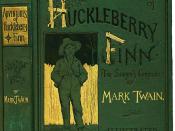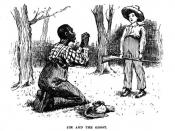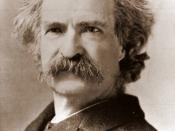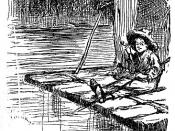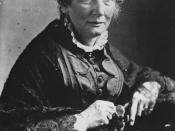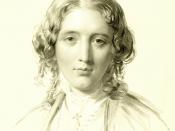The Adventures of Huckleberry Finn by Mark Twain is, still today, considered one of the "great American novels"ÃÂ of all time. Twain achieves this merit through his criticism of slavery, society, and his overall sarcastic writing style. His mastery over dialect has continued to entrance readers through the rough, yet calculated character dialogues. Furthermore, The Adventures of Huckleberry Finn successfully tells the story through the eyes of an innocent, worldly thirteen year-old boy, thereby showing the trappings of society through as unbiased a view as possible. Yet despite its apparent distinction, many critics have attacked the books for a variety of reasons. Included in these critics is Jane Smiley, who views the book as being unworthy of being taught in school because of how it "advocates racism"ÃÂ. Twain is accused by Smiley of not addressing the issue of slavery properly and his overuse of the word "nigger"ÃÂ. Despite her arguments it is quite clear that The Adventures of Huckleberry Finn is worthy of being taught to students because it conveys a deeper meaning of slavery than Smiley's intended replacement, Uncle Tom's Cabin.
One of Jane Smiley's main arguments is that Harriet Beecher Stowe, in Uncle Tom's Cabin, more effectively battles the issue of slavery than does Mark Twain. Yet as we look into her own writing, Smiley mentions Twains use of Jim as the counter-voice to Huck's own social conscience. Twain intentionally makes Jim's voice less powerful than any other characters because, unlike Harriet Beecher Stowe's character, most enslaved Negroes did not have a voice at all. The democratic system was completely foreign to the average 19th century African-American. Yet Jim's own compassion allows the reader to see through the shyness into a deeper human sensitivity. Stowe's characters wore their minds, souls, and emotions on their sleeves hiding nothing from the men who were supposed to be their enemies. In such an instance, it is easy to tell the complexity of The Adventures of Huckleberry Finn is indeed worthy of being taught, whether or not solely for the issues argued on the pages of the novel.
Jane Smiley also indicates that the strength of Uncle Tom's Cabin comes from that "nothing about slavery was attractive"ÃÂ in its portrayal, and that Stowe actually emphasized a "lack of conflict"ÃÂ in her novel. Yet this is really where Uncle Tom's Cabin fails to achieve greatness. As witnessed in the river boat scene in Uncle Tom's Cabin everyone was either pro-slavery or against it "ÃÂ black or white. In The Adventures of Huckleberry Finn, however, many of the characters avoid the issue of slavery because of their confusion. No one really knew whether or not it was wrong, it was just the way it was done. Some stood clearly on one side or the other of the issue, but for the most part, the people adopted attitudes of regret or remorse for some slaves while loathing them in other aspects. Mark Twain is certainly more correct in his depiction of humanity and its need for following customs, people, or ideas rather than Stowe's unnaturally strong-willed characters. Because Stowe actually depicted the characters in a more extremist view she only achieved sympathy toward the blacks, not sincere doubtfulness of the institution itself. While both novels are indeed worthy of the inferred status, "classic"ÃÂ, only The Adventures of Huckleberry Finn truly proved its place among the greatest novels simply because of it representation of slavery, not merely as a simple social epidemic, but as a multidimensional, multifaceted, social impasse.
While Smiley did make the point that every great novel has characteristic flaws, she also managed to point out some within Uncle Tom's Cabin unknowingly. As such, it is simple to conclude that with every novel, any number of defects should not deprive future generations of any "classic"ÃÂ literature. Without flaws, eager school children would not have the pleasure of writing complex literary criticism on great American novels.
